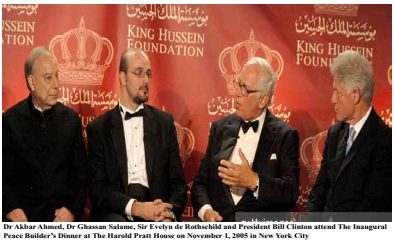Pakistan and Islam’s Ambassador at Large
By Yasser Latif Hamdani

Dr Akbar S Ahmed, the Ibn-e-Khuldun Chair of Islamic Studies at American University Washington and Pakistan’s former High Commissioner to the UK, has to be the loudest voice of reason, moderation and tolerance in terms of scholarship on both Pakistan and Islam in the West. I was fortunate to be present at one of his talks at the Wilson Center in Washington DC recently, where he launched his book “Journey into Europe, Islam Immigration and Identity”.
This book is the continuation of a series where over the last decade and a half Dr Ahmed has traveled all over the world including the Muslim World, the US and now Europe with a dedicated team of young researchers, including Muslims, Christians, Jews and Hindus. In doing so he has a great service in bridging the divides between various cultures and civilizations while simultaneously bringing out the immense diversity of views and cultures that make up the world of Islam today.
The service he has done so far to humanity has not been sufficiently recognized especially in the country of his origin and that is a great tragedy because in him we have a phenomenal genius who is not just a great academic but remains the ambassador at large of both Pakistan and Islam. This is a position that he has achieved through sheer hard work, persistence and a keen eye for optics of his actions. Everything he does therefore turns to gold.
His latest book is a remarkable interdisciplinary study of both Europe and the ongoing Muslim migration there. It draws not just on anthropological study of Muslim communities in Europe today but also on literature and history. In each chapter you are exposed to new information about various European people and their past, before he moves on to the existence of Muslims in the margins of these societies.
In a series of questions, he then constructs a narrative of each section and subsection. He does not discriminate. There is no theological bone to pick in his work. Indeed, the greatest quality of his scholarship is that it is based first and foremost on compassion. Compassion, Dr Ahmed says, is the cornerstone of Islam, Sharia and the jurisprudence emerging out of it. Toleration both between Islam and other religions and within Islam itself is therefore the very essence of Dr Ahmed’s anthropological study. No distinction is made between any sect or sub-sect of Islam, including Sunnis, Shias and Ismailis. There is even a section on Ahmadis, the most marginalized of Islamicate groups in the world today, which shows us that Dr Ahmed is not one to shy away from controversy. Like his hero Mr Jinnah, Dr Ahmed is perfectly happy and content to include Ahmadis within the Islamic milieu, something which is unthinkable in Pakistan today. Indeed, it is unlawful to do so since 1984.
Dr Ahmed, however, is a votary of Jinnah’s Pakistan, a tolerant, inclusive and modern Pakistan, and consequently rejects the demolition job done by everyone in the country today. At a time when Pakistan stands at the precipice of a genocide of this community, Dr Ahmed is the most credible voice against persecution.
A section of Pakistan’s so called intelligentsia has at time unfairly criticized Dr Ahmed of self-promotion and opportunism. In my pieces on Dr Ahmed I have not addressed this criticism knowing that I would be accused of being partisan to him. However, the very fact that Dr Ahmed has repeatedly taken this great risk of including Ahmadis as part of the broader Muslim community should show that Dr Ahmed’s life long struggle has nothing to do with self-aggrandizement of any kind. If he had wanted, given his history and personal connections, Dr Ahmed could have easily have become a senator, minister or a governor in Pakistan but he instead dedicated himself to the life of a teacher in exile and a researcher. Unfortunately, as I pointed out in my own comments at the event, Pakistani people have an unfortunate habit of trying to bring down people who try and do good by them.
The great scholar of Islam Fazlur Rahman was driven out of Pakistan in 1960s because he stood for a progressive and modernist interpretation to Islam. We did this to Zafrullah Khan and Dr Salam because of their faith. We drove out the finance genius M M Ahmad too for the same reason. We did this to Malala because she dared to speak for girl’s education and was unfairly maligned as a stooge of the global powers. Clerics abused Edhi because Edhi would not discriminate on the basis of religion, gender or parentage. Ambassador Husain Haqqani remains in exile with red notices issued against him because he is seen as a ghaddar because he criticizes certain holy cows in Pakistan’s power structure.
I have often asked Dr Akbar Ahmed how he deals with his detractors who are mostly upset at the position of primacy he enjoys in the Western academia on Islam. He has often told me that such people have never mattered to him and that he will continue to do so as long as possible.
Given the rise of ultra-right populism in the West simultaneously with the largest immigration of Muslims there, the work that Dr Ahmed is doing becomes even more urgent. This is why every time he speaks, there is a full house listening to him.
(The writer is a practicing lawyer and a Visiting Fellow at Harvard Law School in Cambridge MA, USA)
-----------------------------------------------------------------------------

